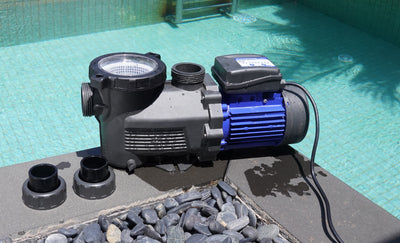11 Household Products to Clean Your Pool Naturally
When it comes to pool cleaning, many people wonder if they really need to use specialized chemicals, especially when there are household products that can do just as good a job at a fraction of the cost. Whether you’re trying to save money or prefer natural cleaning solutions, several everyday household items can help you maintain a healthy and clean pool. Here’s a list of 11 household products you can use to clean your pool while saving money and avoiding harsh chemicals.
1. Baking Soda
Baking soda is one of the most versatile and affordable natural cleaners. By making a simple paste with water, you can clean pool tiles, grout, and even your pool deck. It's non-abrasive and gentle, making it a perfect alternative to harsh chemicals for routine cleaning.
Bonus Tip: Baking soda can also raise your pool's alkalinity, which helps balance your pool’s pH. Add 1.5 pounds for every 10,000 gallons of water to increase the alkalinity by 10 ppm.
2. Bleach (Sodium Hypochlorite)
Household bleach, which contains sodium hypochlorite, is great for tackling tough stains that baking soda can’t remove. It’s also effective for shocking your pool, which is the process of superchlorinating the water to kill bacteria and algae.
Bonus Tip: Use 1 gallon of bleach per 10,000 gallons of water to increase the free chlorine level by 5.25 ppm. Be cautious and make sure not to exceed the ideal chlorine level of 3 ppm.
3. Muriatic Acid
Muriatic acid is a powerful cleaner often used to acid-wash concrete or gunite pools. It’s particularly effective at removing stubborn calcium deposits or scaling around the waterline.
Bonus Tip: Muriatic acid can also lower your pool's alkalinity. Add carefully, as it can significantly alter your pool’s pH levels.
Important Safety Note: Always wear protective gloves, eyewear, and clothing when using muriatic acid, as it is a strong acid.
4. Borax
Borax, often found in laundry rooms, is another natural cleaning agent for pools. Create a paste with water and use it to remove residue, sticky spots, and stains from pool surfaces. It’s less abrasive than some alternatives and can clean without damaging delicate surfaces.
Bonus Tip: Borax can also help raise your pool’s pH. Add half a cup per 10,000 gallons of water to gradually increase pH levels.
5. Olive Oil
While you don’t want oil in your pool water, olive oil can be a natural cleaner for sticky spots around the pool deck. Whether it’s tree sap or spilled beverages, olive oil helps break down the mess, making it easier to clean up with mild soap and water.
Bonus Tip: After swimming, use olive oil as a natural moisturizer to hydrate your skin and lock in moisture.
6. White Vinegar
Calcium buildup at the waterline can be an eyesore. White vinegar is a natural acid that effectively removes these deposits. Mix a 50/50 solution of vinegar and water, apply it to a sponge, and scrub away the buildup.
Bonus Tip: Vinegar can also restore the shine to metal surfaces like pool ladders and handles.
7. Lemon Juice
Lemon juice, with its natural citric acid, is another great option for cleaning pool surfaces. It works wonders on calcium deposits and even rust stains. Combine it with salt for an extra-strong cleaning paste, or apply undiluted lemon juice for tougher stains.
Bonus Tip: Growing a lemon tree near your pool offers benefits like added shade and fresh lemons for cleaning, not to mention lemonade for hot summer days.
8. Rubbing Alcohol
Rubbing alcohol is excellent for removing sticky residue and shining metal surfaces. Mix it with water (50%-70% alcohol) for cleaning, and be sure to use it on non-porous surfaces like stainless steel.
Bonus Tip: Keep rubbing alcohol on hand for minor injuries. If someone falls while playing around the pool, you can use it to disinfect small cuts or scrapes.
9. Simple Green
Simple Green is a non-toxic, environmentally friendly cleaner that works well on a variety of pool surfaces. It can remove stains, grime, and even light rust. It’s concentrated, so be sure to dilute it according to the manufacturer’s instructions.
Bonus Tip: Because it’s gentle, Simple Green is safe to use on pool covers, plastic toys, and vinyl liners.
10. Melamine Sponges (Magic Erasers)
Melamine sponges, commonly known by the brand name Magic Erasers, are great for scrubbing tough stains and residue off your pool surfaces. These sponges don’t require any chemicals—just water and a little elbow grease.
Bonus Tip: Melamine sponges work wonders on vinyl pool furniture too. If you have white vinyl chairs or patio furniture, they’ll restore them to looking brand new.
11. Vitamin C Tablets
Surprisingly, crushed vitamin C tablets (ascorbic acid) can help remove stains and even rust from pool surfaces. Simply crush the tablets and scrub the affected area to get rid of stains.
Bonus Tip: While vitamin C tablets won’t replace your daily supplements, they’re an effective and natural way to address stains in your pool.
Important Reminders
While these household products are generally safe and effective, always use them cautiously. Test your pool water regularly to ensure it remains balanced, especially after using any cleaning agents. A reliable pool water test kit can help you monitor key factors like pH, alkalinity, and chlorine levels.
Additionally, before using any household products in your pool, check the labels to ensure you’re not introducing any harmful chemicals that could damage your pool equipment or affect water quality.
Maintaining a clean and healthy pool doesn't have to be expensive or involve harsh chemicals. With these simple, natural cleaning solutions from around the house, you can keep your pool sparkling clean and inviting all season long. Always test the water after cleaning and ensure it’s balanced to maintain a safe swimming environment for everyone.

